![The Gentle Storm - The Diary]() It’s not news that I’m a big fan of Arjen Lucassen’s output from the last 5 or 6 years. Starting with 2009’s unparalleled Guilt Machine, Arjen has released a string of records that I love. In full defiance of Angry Metal Guy’s Law of Diminishing Recordings™, the “poofy-haired Dutchman” has seemingly upped his game on every release: a great solo release, a seriously enjoyable Star One disc, and a stellar Ayreon album which landed #2 on my Top 10(ish) of 2013. So it was with unabashed enthusiasm that I began my countdown when I heard he was working with Anneke van Giersbergen, formerly of The Gathering, on a project entitled The Gentle Storm. The project is a fascinating idea and there isn’t a single other musician alive aside from Lucassen to whom I would entrust such a task. The record—which is simply one full-length worth of material (roughly an hour)—is recorded in two different styles. Disc 1—or in this case, Sides 1A, 1B, and 2A—is Gentle, a full-length concept album done using primarily orchestral instruments, including a real double bass, piano, and acoustic guitars. Disc 2 (sides 2B, 3A, & 3B) is Storm, which are the same songs produced in a style much more akin to the most recent Ayreon record in tone—progressive rock, occasionally cresting into metal, with different arrangements.
It’s not news that I’m a big fan of Arjen Lucassen’s output from the last 5 or 6 years. Starting with 2009’s unparalleled Guilt Machine, Arjen has released a string of records that I love. In full defiance of Angry Metal Guy’s Law of Diminishing Recordings™, the “poofy-haired Dutchman” has seemingly upped his game on every release: a great solo release, a seriously enjoyable Star One disc, and a stellar Ayreon album which landed #2 on my Top 10(ish) of 2013. So it was with unabashed enthusiasm that I began my countdown when I heard he was working with Anneke van Giersbergen, formerly of The Gathering, on a project entitled The Gentle Storm. The project is a fascinating idea and there isn’t a single other musician alive aside from Lucassen to whom I would entrust such a task. The record—which is simply one full-length worth of material (roughly an hour)—is recorded in two different styles. Disc 1—or in this case, Sides 1A, 1B, and 2A—is Gentle, a full-length concept album done using primarily orchestral instruments, including a real double bass, piano, and acoustic guitars. Disc 2 (sides 2B, 3A, & 3B) is Storm, which are the same songs produced in a style much more akin to the most recent Ayreon record in tone—progressive rock, occasionally cresting into metal, with different arrangements.
As an album The Diary is a story of two 17th century lovers, separated as the man—Joseph Warwijck—leaves his wife—Susanne Vermeer—in the Netherlands while going abroad for two years, communicating with her only via letters. While separated, Susanne discovers that she is pregnant with their son, and tragically becomes sick while Joseph is on his way back. The flow of the record cannot explain the entire story—which is more complex than can be captured in 11 songs—but picks up episodes of communication in each different song. The story follows these two separated lovers whose letters continue to miss each other, and culminates with a gorgeous, but tragic moment (“Epilogue: The Final Entry”). The letters are littered with feelings and impressions; “Shores of India” blends orchestra with sitar and hand-drumming with reflections of the wonders of discovering an exotic place. “The Moment,” aches with Susanne’s discovery that she is ill, while “Eyes of Michiel” pulses with the joy of discovery and awe at the glories of the world so far away from Amsterdam and the man’s newborn son. “New Horizons,” the record’s penultimate track, is a hopeful, yet heart-wrenching track from a dying woman to a man who doesn’t yet know that she is even sick. Anneke’s lyrics are subtle, smart, and well-written, and the after delving into the story I can’t help but get a bit verklempt on the record’s bittersweet close.
![The Gentle Storm 3]() Musically, The Diary shows off the strength of Arjen’s compositions, demonstrating his deft use of melody and his honed sense of harmony. The compositions border on neo-classical, but straddle a plethora of styles, and it is precisely this ability to straddle so much variation but make it distinctively his own which makes The Diary such a radiant success. Gentle, the folk disc, is among his finest arrangements to date. What separates the music from other things he’s previously written is his freedom to play with sounds and textures. Gentle uses 40 different instruments, including sitar, french horn, with a sound that sounds like a small a chamber orchestra. There are no keyboards used on Gentle, only a piano, and the sound is subtle, rich, and stunning.
Musically, The Diary shows off the strength of Arjen’s compositions, demonstrating his deft use of melody and his honed sense of harmony. The compositions border on neo-classical, but straddle a plethora of styles, and it is precisely this ability to straddle so much variation but make it distinctively his own which makes The Diary such a radiant success. Gentle, the folk disc, is among his finest arrangements to date. What separates the music from other things he’s previously written is his freedom to play with sounds and textures. Gentle uses 40 different instruments, including sitar, french horn, with a sound that sounds like a small a chamber orchestra. There are no keyboards used on Gentle, only a piano, and the sound is subtle, rich, and stunning.
The range of tonal variation and the ability to powerfully convey feelings and emotional crescendos shows up on songs like “Cape of Storms,” which pulses along with a stand-up bass at its heart, thrumming the ocean’s depth. “Heart of Amsterdam” shines, with an a folk melody carried by violin and with dulcimer underneath, but gives way to a swing feel that Anneke’s voice transforms from beautiful to transcendent. “Eyes of Michiel” pulses with energy, showing off the range of Anneke’s vocals and Arjen’s writing, while the combination of the percussion—drums that sound like casks and a creaking ship—and ebullient fiddle and recorder which evokes a ‘pirate song’ feel that so many fail at, but which shines here. Similar to the feel that enraptured me on A New World, the nearly minimalist intimacy of Gentle‘s arrangements gives me goosebumps.
On the flip-side, the subtle crescendos and nuanced, intimate sounds of all the textures gives way to something far more epic in scope. Where a single violin might have carried a melody, instead an orchestra takes the counter melody, the use of a full choir takes the whole sound up to epic levels—working effectively on tracks like “The Storm,” to really push the music to epic proportions. The production is wet, and where hand-percussion was used, the drums are handled by Ed Warby who manages the dynamic demands with alacrity. Tracks like “The Moment,” a heart-wrenching song and subtle song on “Gentle,” gives way to an epic build with keys and 8th note double-bass—which evokes the sound from The Theory of Everything. The record breaks out into genuinely driven, heavy music on “The Storm,” which not only sparks with epic energy, but which shows off Anneke’s power and vocal control. “Eyes of Michiel” carries the melodies with heavy battery support, and brings harmonized melody and counter melody to guitars, and here again, the drums transform the song into something almost introspective and joyous to a powerful cascade of sound. Smartly, Anneke’s vocals are mixed back and the heavy material is quite bass heavy. The guitar tone is crisp, while backed by Warby’s fat drums and a bass that never gets lost in the mix of a dense record.
![TheGentleStorm7 web]()
What amazes me most, though, is that the first few times I put this album in, I just listened to it from start to finish. Instead of feeling a desire to choose one or the other, my brain treated The Diary as a whole record. Sure, it was the same songs being repeated: but take a song like “Shores of India” or “The Storm” and compare them and you’ll find that Arjen’s ability to transcend styles with writing is complete. Lucassen doesn’t do things in half-measures, and The Diary exemplifies this point effectively. Arjen isn’t alone, either, as Anneke shows off her diverse vocal strengths by delivering amazing performances on both Gentle and Storm, showing both grace and power in equal measure. Furthermore, having received the LP mix to review, I have to say that the production on this record is the best he’s ever done. Similar to Steven Wilson, Arjen is coming into his own in his later years, and this is as true of his writing as it is of his production. His range—the wide variety of instruments used and styles balanced—is demonstrated here, where everything sits in a perfect place. Handling orchestras and sitars and full choirs is a challenging task, and both Gentle and Storm are exemplars of taste and brilliant touch.
If I had to choose, I think I like Gentle better than Storm. When moving from a production that is so beautifully textured and rich, with songs that move me deeply, and a sound that makes me want to just lay on my back and absorb their beauty, it’s tough to make the jump to Storm. Storm‘s sound, by necessity, is simply less dynamic. The use of keyboards to do some of the work that is done by real instruments in Gentle undermines those dynamics. This is a consequence of “metal.” As plenty of bands have shown, it is extremely difficult to balance orchestration, and different sounds with the pummeling of drums, heavily compressed guitars, and the volume necessarily involved. This doesn’t mean that Storm is bad, though: because it’s also brilliant. However, when my ears have been so spoiled by all that intimate, dynamic music, the sound feels a bit more canned. And in some ways, it leaves me longing for Arjen to figure out how to blend the heavy sounds with the rich, dynamic diversity of the lighter ones on future records.
Minor quibbles aside, The Gentle Storm is a resounding success, and one of the finest records that you’re going to hear this year. While I have loved Arjen’s other material in the last few years, this is as close to the adoration I felt for Guilt Machine since 2009. The amount of work put into this album—and yet the speed with which it came together—is astounding. The combination of Anneke’s beautiful vocals and excellent performance with Arjen’s writing and a huge cast of musicians has resulted in something that I imagine they’re all truly proud to have been involved in, and that is truly unique.
Rating: Guilt Machine/Guilt Machine
Vinyl DR: 13 [Gentle], 12 [Storm] | Format Reviewed: 24-bit FLAC [vinyl master]
CD DR: 10 [Gentle], 7 [Storm] | Format: v2 mp3
Websites: arjenlucassen.com | facebook.com/thegentlestorm
Label: InsideOut Music
Release Dates: EU: 2015.03.23 | US: 2015.03.24
The post The Gentle Storm – The Diary [Vinyl Review] appeared first on Angry Metal Guy.
![Flattr this!]()
 Symphony X nerds rejoice! Then again, maybe you won’t. Symphony X bassist Mike LePond’s first solo effort was released in September of this year and those expecting LePond to stick to his primary band’s keyboard-laden progressive metal path may be sorely disappointed. If you are, get that geeky head out of your pale behind (if you can get up off it long enough between games of Skyrim) because Silent Assassins is a full-on, bad ass traditional power metal album of such a caliber that my crusty old metal ears have been transported back to when albums like this were new and not mere nostalgia.
Symphony X nerds rejoice! Then again, maybe you won’t. Symphony X bassist Mike LePond’s first solo effort was released in September of this year and those expecting LePond to stick to his primary band’s keyboard-laden progressive metal path may be sorely disappointed. If you are, get that geeky head out of your pale behind (if you can get up off it long enough between games of Skyrim) because Silent Assassins is a full-on, bad ass traditional power metal album of such a caliber that my crusty old metal ears have been transported back to when albums like this were new and not mere nostalgia.

 Yep, this is one of those albums. There’s not a sphere to be had on that cover, much less a corpse, but it remains one of the more striking and subtly unnerving pieces of album art around. It’s not like other covers, and Dimesland is not like other bands. Psychogenic Atrophy is the Oakland, California quartet’s first LP, hoping to ride on the coattails of bizarre death metal bands like Gorguts and Pyrrhon that we all love so dearly. Yet Psychogenic Atrophy provides us with a plastic disc filled with a music that is almost, but not quite, entirely unlike technical death metal. Dimesland call themselves “abstract metal.” What does that mean?
Yep, this is one of those albums. There’s not a sphere to be had on that cover, much less a corpse, but it remains one of the more striking and subtly unnerving pieces of album art around. It’s not like other covers, and Dimesland is not like other bands. Psychogenic Atrophy is the Oakland, California quartet’s first LP, hoping to ride on the coattails of bizarre death metal bands like Gorguts and Pyrrhon that we all love so dearly. Yet Psychogenic Atrophy provides us with a plastic disc filled with a music that is almost, but not quite, entirely unlike technical death metal. Dimesland call themselves “abstract metal.” What does that mean?
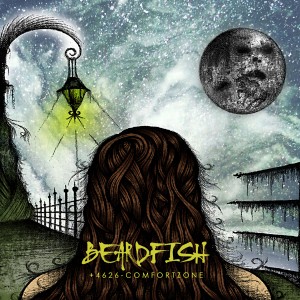 Somewhere on the outskirts of progressive music, amidst waves of 9-string trendhoppers and unbearable Dream Theater knockoffs, exists the entity known as Beardfish. This Swedish quartet has been cranking out thoughtfully complex music and left-field lyrics for over a decade, though I must admit that my own experience with them is limited to what I’ve heard in my friend’s car. Their new record is cryptically titled +4626-Comfortzone.
Somewhere on the outskirts of progressive music, amidst waves of 9-string trendhoppers and unbearable Dream Theater knockoffs, exists the entity known as Beardfish. This Swedish quartet has been cranking out thoughtfully complex music and left-field lyrics for over a decade, though I must admit that my own experience with them is limited to what I’ve heard in my friend’s car. Their new record is cryptically titled +4626-Comfortzone.
 Believe it or not, we tend to research the bands we review here, even if it’s occasionally more tempting just to mash our palms against the keyboard for five hundred words, assign an arbitrary score, then knock off down to the pub. This week has, therefore, seen me listening to an unhealthy amount of the genre that discerning metalheads love to hate: djent (
Believe it or not, we tend to research the bands we review here, even if it’s occasionally more tempting just to mash our palms against the keyboard for five hundred words, assign an arbitrary score, then knock off down to the pub. This week has, therefore, seen me listening to an unhealthy amount of the genre that discerning metalheads love to hate: djent (
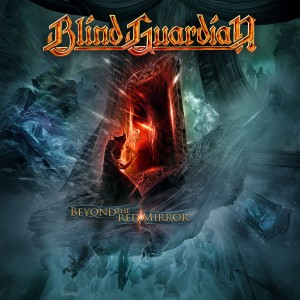 Blind Guardian is a German institution and national treasure. The band embodies the peak of the German power-thrash tradition in ways that nod to their countrymen, but separated them from the pack decades ago. Their body of work is surely among the most comprehensively epic and impressive among modern metal bands, and they are a band whose sound is a point of reference rather than a derivation. So when these titans of Teutonic metal release a new record the metal world turns to pay its respects. Put differently, Beyond the Red Mirror has been on my calendar since I heard of its release, and when asked, fans of this blog have also said resoundingly that it’s one of the most anticipated records of 2015. As long-time readers of this blog are aware, anticipation can be dangerous. One might surmise that Angry Metal Guy’s Law of Diminishing Recordings™ is contingent not on an individual band’s output, but instead correlates with heightened expectations from fans and reviewers
Blind Guardian is a German institution and national treasure. The band embodies the peak of the German power-thrash tradition in ways that nod to their countrymen, but separated them from the pack decades ago. Their body of work is surely among the most comprehensively epic and impressive among modern metal bands, and they are a band whose sound is a point of reference rather than a derivation. So when these titans of Teutonic metal release a new record the metal world turns to pay its respects. Put differently, Beyond the Red Mirror has been on my calendar since I heard of its release, and when asked, fans of this blog have also said resoundingly that it’s one of the most anticipated records of 2015. As long-time readers of this blog are aware, anticipation can be dangerous. One might surmise that Angry Metal Guy’s Law of Diminishing Recordings™ is contingent not on an individual band’s output, but instead correlates with heightened expectations from fans and reviewers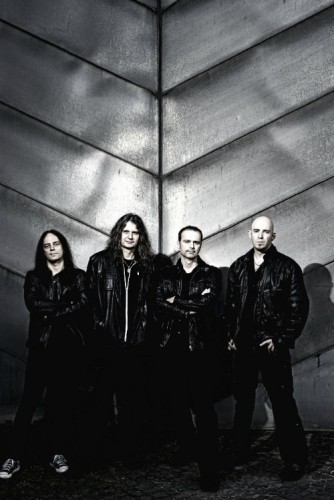 And Beyond the Red Mirror cannot be faulted for its epic vision. “The Ninth Wave” starts the album off with a choir singing in Latin (“
And Beyond the Red Mirror cannot be faulted for its epic vision. “The Ninth Wave” starts the album off with a choir singing in Latin (“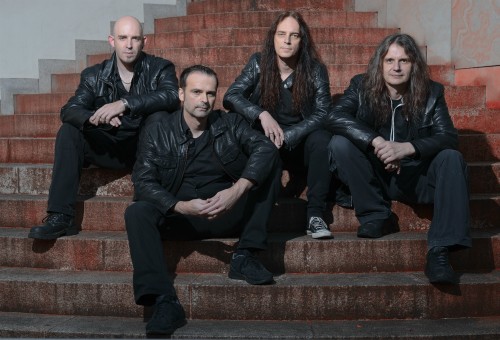
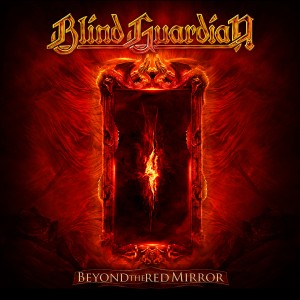 On the one hand, I try to listen to it at work in my half-good work headphones and it sounds not great, in my generally pretty high performing earbuds? Flat, flat, flat. Small speakers? The same thing. My theory—but I don’t know enough about producing orchestral metal to say with certainty—is that it’s about the choices that had to be made in order to fit the band’s already dense sound into the same box as an orchestra all at the low, low DR of 8. I’ll be curious to see if the vinyl mix has this problem…
On the one hand, I try to listen to it at work in my half-good work headphones and it sounds not great, in my generally pretty high performing earbuds? Flat, flat, flat. Small speakers? The same thing. My theory—but I don’t know enough about producing orchestral metal to say with certainty—is that it’s about the choices that had to be made in order to fit the band’s already dense sound into the same box as an orchestra all at the low, low DR of 8. I’ll be curious to see if the vinyl mix has this problem… Iceland’s Momentum is a bizarre beast. Aside from having a name and logo more suitable for a caffeine-packed energy drink than a metal band, they’ve undergone quite a few changes in style since their debut demo. Starting out as a black metal group called Afsprengi Satans, they released the wonderfully named Death to Christianity under the Momentum moniker in 2004, followed up by the remarkably unique and entertaining death metal EP The Requiem in 2006. A further EP followed, and by the time 2010’s full-length Fixation, at Rest emerged, Momentum had morphed still further away from their black metal roots. Hints of blackened bleakness remained, but Fixation, at Rest was essentially a post-metal record, full of Isis and Neurosis-isms alongside doom and death metal influences. Momentum are clearly not afraid of experimentation, and so far they’ve been achieving rather good results.
Iceland’s Momentum is a bizarre beast. Aside from having a name and logo more suitable for a caffeine-packed energy drink than a metal band, they’ve undergone quite a few changes in style since their debut demo. Starting out as a black metal group called Afsprengi Satans, they released the wonderfully named Death to Christianity under the Momentum moniker in 2004, followed up by the remarkably unique and entertaining death metal EP The Requiem in 2006. A further EP followed, and by the time 2010’s full-length Fixation, at Rest emerged, Momentum had morphed still further away from their black metal roots. Hints of blackened bleakness remained, but Fixation, at Rest was essentially a post-metal record, full of Isis and Neurosis-isms alongside doom and death metal influences. Momentum are clearly not afraid of experimentation, and so far they’ve been achieving rather good results. The November’s Doom comparison extends to the production. The guitar tone is very similar to that on To Welcome the Fade: somewhat wishy-washy and lacking crunch, but suiting the general atmosphere. Momentum make use of some unusual instruments to add diversity to the sound – the occasional sitar, piano and violin creating textural variety. Occasionally these extra elements get lost in the density of the mix and you have to really listen to pick up on some of the piano overtones, but they’re a nice touch and could perhaps have been made a little more of. The wonderfully punchy drums help keep things from becoming too static during the slower sections, while the warm bass provides a solid foundation for the other instruments to swarm over.
The November’s Doom comparison extends to the production. The guitar tone is very similar to that on To Welcome the Fade: somewhat wishy-washy and lacking crunch, but suiting the general atmosphere. Momentum make use of some unusual instruments to add diversity to the sound – the occasional sitar, piano and violin creating textural variety. Occasionally these extra elements get lost in the density of the mix and you have to really listen to pick up on some of the piano overtones, but they’re a nice touch and could perhaps have been made a little more of. The wonderfully punchy drums help keep things from becoming too static during the slower sections, while the warm bass provides a solid foundation for the other instruments to swarm over.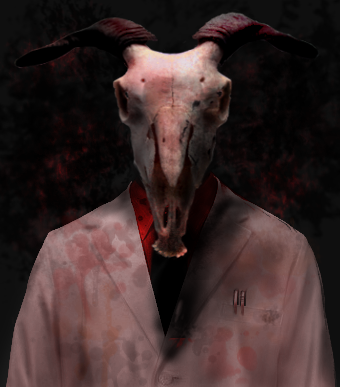 Just about every day, Angry Metal Guy pushes out a review of an upcoming or recently released album, producing press for the album whether we love it or hate it. It exposes readers to a lot of material, but disadvantages artists who aren’t putting out music at any given time. Given a small temporal window, this creates a very biased sample of the music scene. I love reviewing albums, but a lot of great and criminally overlooked bands are in between releases right now, and it kills me to see their hard work go unseen. So in order to rectify their invisibility, they’re being talked about here, where you can be held captive by the unbreakable bonds of html and subjugated to my terrible opinions.
Just about every day, Angry Metal Guy pushes out a review of an upcoming or recently released album, producing press for the album whether we love it or hate it. It exposes readers to a lot of material, but disadvantages artists who aren’t putting out music at any given time. Given a small temporal window, this creates a very biased sample of the music scene. I love reviewing albums, but a lot of great and criminally overlooked bands are in between releases right now, and it kills me to see their hard work go unseen. So in order to rectify their invisibility, they’re being talked about here, where you can be held captive by the unbreakable bonds of html and subjugated to my terrible opinions. It was before a long journey that I haphazardly shoved all my new music on to my iPod, paying no regard to the attached one sheets and band biographies. Having never heard their material before, it was without expectation or even awareness of genre that I approached Seven Year Storm‘s début EP Aion I. Perhaps this should be my new method of promo selection: zero experience, zero genre prejudice, maximum joy when what hits you is brilliant. Sean Lang, the Canadian mastermind behind the project, is noted for his online drum tutorials and eclectic range of associated acts, including melodeath outfit First Reign, art rock and pop cover band A Night of Bowie, and folk cover band Byrd Dawg. With such a diverse range of influences in his percussive repertoire, it shouldn’t shock you that his drumming is at the forefront of this progressive metal EP. Though certainly not overtly metal in its chilled atmosphere and lack of extremity, the supreme instrumentation and delightful compositions enchanted me.
It was before a long journey that I haphazardly shoved all my new music on to my iPod, paying no regard to the attached one sheets and band biographies. Having never heard their material before, it was without expectation or even awareness of genre that I approached Seven Year Storm‘s début EP Aion I. Perhaps this should be my new method of promo selection: zero experience, zero genre prejudice, maximum joy when what hits you is brilliant. Sean Lang, the Canadian mastermind behind the project, is noted for his online drum tutorials and eclectic range of associated acts, including melodeath outfit First Reign, art rock and pop cover band A Night of Bowie, and folk cover band Byrd Dawg. With such a diverse range of influences in his percussive repertoire, it shouldn’t shock you that his drumming is at the forefront of this progressive metal EP. Though certainly not overtly metal in its chilled atmosphere and lack of extremity, the supreme instrumentation and delightful compositions enchanted me.
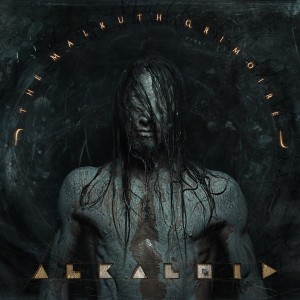 When guitarist Christian Muenzner (Spawn of Possession, ex-Necrophagist) and drummer Hannes Grossman (Blotted Science, ex-Necrophagist) departed Obscura last year, needless to say I was pretty bummed. The duo was an integral part of the band’s sparkling technical and progressive death metal formula that yielded back-to-back masterworks in Cosmogenesis and Omnivium. So while Obscura’s future looks uncertain, the gifted pair have forged ahead with a brand spankin’ new outfit called Alkaloid featuring an all-star line-up comprising Danny Lunker (Aborted, ex-God Dethroned) on guitars, Morean (Dark fortress, Noneuclid) on vocals, and Linus Klausenitzer (Obscura, Noneuclid) handling bass. So do Alkaloid deliver on the promise of a ridiculously talented group of musicians, or is The Malkuth Grimoire yet another example of a star-studded line-up weaker than the sum of its parts?
When guitarist Christian Muenzner (Spawn of Possession, ex-Necrophagist) and drummer Hannes Grossman (Blotted Science, ex-Necrophagist) departed Obscura last year, needless to say I was pretty bummed. The duo was an integral part of the band’s sparkling technical and progressive death metal formula that yielded back-to-back masterworks in Cosmogenesis and Omnivium. So while Obscura’s future looks uncertain, the gifted pair have forged ahead with a brand spankin’ new outfit called Alkaloid featuring an all-star line-up comprising Danny Lunker (Aborted, ex-God Dethroned) on guitars, Morean (Dark fortress, Noneuclid) on vocals, and Linus Klausenitzer (Obscura, Noneuclid) handling bass. So do Alkaloid deliver on the promise of a ridiculously talented group of musicians, or is The Malkuth Grimoire yet another example of a star-studded line-up weaker than the sum of its parts?

 Remember a couple years ago when Meshuggah and Diablo Swing Orchestra were going to form a supergroup? Yeah that never actually happened, but it would be a cool idea right? If you already had this idea,
Remember a couple years ago when Meshuggah and Diablo Swing Orchestra were going to form a supergroup? Yeah that never actually happened, but it would be a cool idea right? If you already had this idea, 
 Barren Earth may be the only band I ever forgive for not giving me an audition to be their vocalist. After it was announced that Mikko Kotamäki (Swallow the Sun) was leaving the band and that they were publicly searching for a singer, I screwed up my courage and dropped them an email with some songs. Being that I am “the standard by which all should be judged” (
Barren Earth may be the only band I ever forgive for not giving me an audition to be their vocalist. After it was announced that Mikko Kotamäki (Swallow the Sun) was leaving the band and that they were publicly searching for a singer, I screwed up my courage and dropped them an email with some songs. Being that I am “the standard by which all should be judged” (
 It’s not news that I’m a big fan of Arjen Lucassen’s output from the last 5 or 6 years. Starting with 2009’s unparalleled
It’s not news that I’m a big fan of Arjen Lucassen’s output from the last 5 or 6 years. Starting with 2009’s unparalleled  Musically, The Diary shows off the strength of Arjen’s compositions, demonstrating his deft use of melody and his honed sense of harmony. The compositions border on neo-classical, but straddle a plethora of styles, and it is precisely this ability to straddle so much variation but make it distinctively his own which makes The Diary such a radiant success. Gentle, the folk disc, is among his finest arrangements to date. What separates the music from other things he’s previously written is his freedom to play with sounds and textures. Gentle uses 40 different instruments, including sitar, french horn, with a sound that sounds like a small a chamber orchestra. There are no keyboards used on Gentle, only a piano, and the sound is subtle, rich, and stunning.
Musically, The Diary shows off the strength of Arjen’s compositions, demonstrating his deft use of melody and his honed sense of harmony. The compositions border on neo-classical, but straddle a plethora of styles, and it is precisely this ability to straddle so much variation but make it distinctively his own which makes The Diary such a radiant success. Gentle, the folk disc, is among his finest arrangements to date. What separates the music from other things he’s previously written is his freedom to play with sounds and textures. Gentle uses 40 different instruments, including sitar, french horn, with a sound that sounds like a small a chamber orchestra. There are no keyboards used on Gentle, only a piano, and the sound is subtle, rich, and stunning.
 As an employee in a soul-sucking government bureaucracy, I’ve heard plenty of hollow buzzwords over the years. But amidst the ‘paradigm shifts’ and ‘synergy’ is a phrase I’ve always thought had actual merit: ‘disciplined initiative.’ Meaning: don’t be afraid to dream and try new things – but maintain quality control. Keep a grip on reality. Don’t fling a bunch of shit around in the name of innovation. It applies as much to the workplace as it does to music. Case in point: Canada’s Éohum.
As an employee in a soul-sucking government bureaucracy, I’ve heard plenty of hollow buzzwords over the years. But amidst the ‘paradigm shifts’ and ‘synergy’ is a phrase I’ve always thought had actual merit: ‘disciplined initiative.’ Meaning: don’t be afraid to dream and try new things – but maintain quality control. Keep a grip on reality. Don’t fling a bunch of shit around in the name of innovation. It applies as much to the workplace as it does to music. Case in point: Canada’s Éohum.
 When the term ‘groove metal’ gets bandied about it usually conjures up negative thoughts about some third-rate Pantera ripoff (anyone remember Pissing Razors?) or something nu-related. I mention it here because it’s a term I’ve seen attached to the music of West Virginia’s Byzantine and such a label is ill-fitting for the versatile music the resilient modern metallers create. For the uninitiated, Byzantine have been around the traps since forming way back in 2000, before releasing their 2004 debut, The Fundamental Component, via Prosthetic Records. A day after dropping their excellent third album Oblivion Beckons in 2008, the band decided to call it quits. Fast forward to 2013 and Byzantine bounced back after reforming with their stylish self-titled comeback album, signalling a triumphant return.
When the term ‘groove metal’ gets bandied about it usually conjures up negative thoughts about some third-rate Pantera ripoff (anyone remember Pissing Razors?) or something nu-related. I mention it here because it’s a term I’ve seen attached to the music of West Virginia’s Byzantine and such a label is ill-fitting for the versatile music the resilient modern metallers create. For the uninitiated, Byzantine have been around the traps since forming way back in 2000, before releasing their 2004 debut, The Fundamental Component, via Prosthetic Records. A day after dropping their excellent third album Oblivion Beckons in 2008, the band decided to call it quits. Fast forward to 2013 and Byzantine bounced back after reforming with their stylish self-titled comeback album, signalling a triumphant return. To Release Is To Resolve begins strongly with the one-two bang of “Scold’s Bridle” and “Justinian Code,” a ripping pair of tunes clearly showcasing Byzantine’s versatility and impressive songcraft. They effortlessly shift between aggressive grooves, off-kilter rhythms, snaking progressive melodies and chugging thrash riffs. The strength of vocalist/guitarist Chris ‘OJ’ Ojeda is evident once again, with his elastic vocal range syncing nicely with Byzantine’s dynamic song-writing. He smoothly shifts gears from assertive melodic cleans to his staple mid-range growls and screams that accompany his Chuck Billy-esque thrashy snarl. The rest of the band is in fine form as well with the musicianship maintaining a uniformly high standard and the revved-up energy levels adding to the fun and infectious nature of Byzantine’s music. “You Sleep, We Wake” in particular maintains a cracking pace and aggressive edge, topped off with some slick soloing and meaty groove.
To Release Is To Resolve begins strongly with the one-two bang of “Scold’s Bridle” and “Justinian Code,” a ripping pair of tunes clearly showcasing Byzantine’s versatility and impressive songcraft. They effortlessly shift between aggressive grooves, off-kilter rhythms, snaking progressive melodies and chugging thrash riffs. The strength of vocalist/guitarist Chris ‘OJ’ Ojeda is evident once again, with his elastic vocal range syncing nicely with Byzantine’s dynamic song-writing. He smoothly shifts gears from assertive melodic cleans to his staple mid-range growls and screams that accompany his Chuck Billy-esque thrashy snarl. The rest of the band is in fine form as well with the musicianship maintaining a uniformly high standard and the revved-up energy levels adding to the fun and infectious nature of Byzantine’s music. “You Sleep, We Wake” in particular maintains a cracking pace and aggressive edge, topped off with some slick soloing and meaty groove.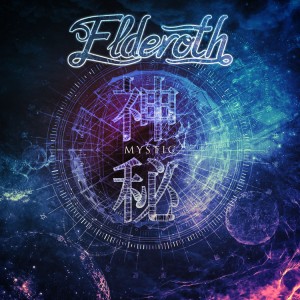 Mid-way through thoroughly enjoying Elderoth‘s second full-length, I was shocked to find myself having internalized the lyrics “Become who you are / just like a pornstar.” Having come to this realization and self-flagellated like the moral young chap I am, I consulted the lyric booklet (eternally exalted is the band that provides more than just a shite band photo with their promos) to find to my intense relief that the lyrics were in fact “Just like a FALLING star.” Befitting of such profoundly cosmic lyrics, the release calls itself Mystic. Mystic is a curious beast indeed, fusing prog-power with a spacey feel and Eastern-influenced, Oriental (for lack of a better word) synths. Citing inspiration from Ritchie Blackmore and his awesome work on Rainbow‘s Rising in their pursuit of Eastern influences, Elderoth foolishly stacked the odds against themselves. Can you possibly believe the hype?
Mid-way through thoroughly enjoying Elderoth‘s second full-length, I was shocked to find myself having internalized the lyrics “Become who you are / just like a pornstar.” Having come to this realization and self-flagellated like the moral young chap I am, I consulted the lyric booklet (eternally exalted is the band that provides more than just a shite band photo with their promos) to find to my intense relief that the lyrics were in fact “Just like a FALLING star.” Befitting of such profoundly cosmic lyrics, the release calls itself Mystic. Mystic is a curious beast indeed, fusing prog-power with a spacey feel and Eastern-influenced, Oriental (for lack of a better word) synths. Citing inspiration from Ritchie Blackmore and his awesome work on Rainbow‘s Rising in their pursuit of Eastern influences, Elderoth foolishly stacked the odds against themselves. Can you possibly believe the hype? Despite this, I think the material would benefit from greater variety. It’s largely delivered well, but it feels very safe and overly saccharine after thirty-five minutes – to continue the Starburst reference. Elderoth‘s focus is commendable but a couple more curve balls would diversify the experience and ensure that the back-end isn’t lost on the metalheads they are catering for. “The Ocean” attempts exactly this, with a thicker guitar tone and lesser synths, plus a subtle interlude to emphasise the final chorus payoff. However, this interlude drags just a little considering the pace elsewhere and the chorus is among the weakest here, rendering the payoff obsolete.
Despite this, I think the material would benefit from greater variety. It’s largely delivered well, but it feels very safe and overly saccharine after thirty-five minutes – to continue the Starburst reference. Elderoth‘s focus is commendable but a couple more curve balls would diversify the experience and ensure that the back-end isn’t lost on the metalheads they are catering for. “The Ocean” attempts exactly this, with a thicker guitar tone and lesser synths, plus a subtle interlude to emphasise the final chorus payoff. However, this interlude drags just a little considering the pace elsewhere and the chorus is among the weakest here, rendering the payoff obsolete. The Kontinuum… continues! Not to be confused with the tech death band Continuum reviewed
The Kontinuum… continues! Not to be confused with the tech death band Continuum reviewed 
 Remember Guitar Hero? Yes, I’m aware it’s 2015, but reach back into the memory vaults for just a second. Somewhere on the screen there’s a crowd pleasure meter that dynamically reacted to how well your performance is going. If you were good, it would stay in green. If you were really bad, it would stay in red, teetering on the edge of total audience disengagement. Being mediocre kept you squarely in yellow. Venuzuelan-turned-American duo Cave of Swimmers send the pleasure needle ricocheting through each of these color-coded sections, making their sophomore release Reflection, bar none, the most frustrating thing I’ve reviewed in my tenure at AMG.
Remember Guitar Hero? Yes, I’m aware it’s 2015, but reach back into the memory vaults for just a second. Somewhere on the screen there’s a crowd pleasure meter that dynamically reacted to how well your performance is going. If you were good, it would stay in green. If you were really bad, it would stay in red, teetering on the edge of total audience disengagement. Being mediocre kept you squarely in yellow. Venuzuelan-turned-American duo Cave of Swimmers send the pleasure needle ricocheting through each of these color-coded sections, making their sophomore release Reflection, bar none, the most frustrating thing I’ve reviewed in my tenure at AMG.
 It can be a herculean challenge to replace a vocalist synonymous with the core sound of a band. Judas Priest and Iron Maiden certainly couldn’t do it, but AC/DC and Accept managed it quite nicely. With Haven, album number two with “new” singer Tommy Karevik (Ayreon, Seventh Wonder) replacing Roy Khan, it seems safe to add Kamelot to the latter group. Following in the footsteps of the surprisingly good
It can be a herculean challenge to replace a vocalist synonymous with the core sound of a band. Judas Priest and Iron Maiden certainly couldn’t do it, but AC/DC and Accept managed it quite nicely. With Haven, album number two with “new” singer Tommy Karevik (Ayreon, Seventh Wonder) replacing Roy Khan, it seems safe to add Kamelot to the latter group. Following in the footsteps of the surprisingly good  Other highpoints include the traditional power metal gallop of “Veil of Elysium,” which is this album’s “Wings of Eternity,” the urgent, Operation: Mindcrime like darkness of “My Therapy” and the industrial-tinged heaviness of “Revolution” where Alissa White-Gluz of Arch Enemy drops some harsh snarls and roars.
Other highpoints include the traditional power metal gallop of “Veil of Elysium,” which is this album’s “Wings of Eternity,” the urgent, Operation: Mindcrime like darkness of “My Therapy” and the industrial-tinged heaviness of “Revolution” where Alissa White-Gluz of Arch Enemy drops some harsh snarls and roars.
 There’s aren’t too many folk metal acts I follow. As a general rule, I’ll gravitate towards the unknown blackened shit, the weird and the obscure as I scour the promo list for new review material. That said, it took two lines in the Artaius promo blurb to stop me in my tracks – Artaius has shared the stage with well-known metal acts like Ensiferum and Primal Fear and Torn Banners features special guests Tim Charles (Ne Obliviscaris), Lucio Stefani (Mé, Pek e Barba) and Dario Caradente (Kalévala). Those be some big selling points right there! Reading a little further I discovered that Artaius are a little known Italian band that merges Celtic folk melodies with modern, groovy riff-work and vintage 70’s era prog rock, to form what they classify as progressive folk metal. A knot of unease settled in when I realized they split vocal duties between Sara Cucci (clean vocals) and Francesco Leone (unclean vocals), but my thoughts finally came around to, if beauty doesn’t snag me, the beast most likely will. Another day, another dollar, Artaius‘ second release is set to hit the shelves any day now, and I’m here to tell you why Torn Banners won’t give you enough bang for your buck.
There’s aren’t too many folk metal acts I follow. As a general rule, I’ll gravitate towards the unknown blackened shit, the weird and the obscure as I scour the promo list for new review material. That said, it took two lines in the Artaius promo blurb to stop me in my tracks – Artaius has shared the stage with well-known metal acts like Ensiferum and Primal Fear and Torn Banners features special guests Tim Charles (Ne Obliviscaris), Lucio Stefani (Mé, Pek e Barba) and Dario Caradente (Kalévala). Those be some big selling points right there! Reading a little further I discovered that Artaius are a little known Italian band that merges Celtic folk melodies with modern, groovy riff-work and vintage 70’s era prog rock, to form what they classify as progressive folk metal. A knot of unease settled in when I realized they split vocal duties between Sara Cucci (clean vocals) and Francesco Leone (unclean vocals), but my thoughts finally came around to, if beauty doesn’t snag me, the beast most likely will. Another day, another dollar, Artaius‘ second release is set to hit the shelves any day now, and I’m here to tell you why Torn Banners won’t give you enough bang for your buck.
 It’s a rare occurrence when a band completely floors me with a debut release. Not just show bright glimmers of potential mind you, but seriously blindside me with a sound that is fresh, unique and remarkably well developed for a first release. Such was the case when Oakland’s Secrets of the Sky seemingly emerged from nowhere with their brilliant opus To Sail Black Waters in 2013, blowing my fragile little mind and establishing themselves as a force to be reckoned with. Blending blackened progressive doom with post metal atmospherics and serious emotional heft, Secrets of the Sky successfully combined a tense ebb and flow with bruising gut punches and sprawling arrangements wrapped in bleak, claustrophobic atmosphere. It was a unique slab of genre splicing excellence which held a broad appeal, particularly for fans of challenging and atmospheric heavy music in the vein of The Atlas Moth, Isis and Neurosis. After inking a deal with the Metal Blade juggernaut, Secrets of the Sky return to deliver Pathway. So with expectations naturally lifted for the all important sophomore album, how does this powerhouse five-piece fare on album number two?
It’s a rare occurrence when a band completely floors me with a debut release. Not just show bright glimmers of potential mind you, but seriously blindside me with a sound that is fresh, unique and remarkably well developed for a first release. Such was the case when Oakland’s Secrets of the Sky seemingly emerged from nowhere with their brilliant opus To Sail Black Waters in 2013, blowing my fragile little mind and establishing themselves as a force to be reckoned with. Blending blackened progressive doom with post metal atmospherics and serious emotional heft, Secrets of the Sky successfully combined a tense ebb and flow with bruising gut punches and sprawling arrangements wrapped in bleak, claustrophobic atmosphere. It was a unique slab of genre splicing excellence which held a broad appeal, particularly for fans of challenging and atmospheric heavy music in the vein of The Atlas Moth, Isis and Neurosis. After inking a deal with the Metal Blade juggernaut, Secrets of the Sky return to deliver Pathway. So with expectations naturally lifted for the all important sophomore album, how does this powerhouse five-piece fare on album number two?